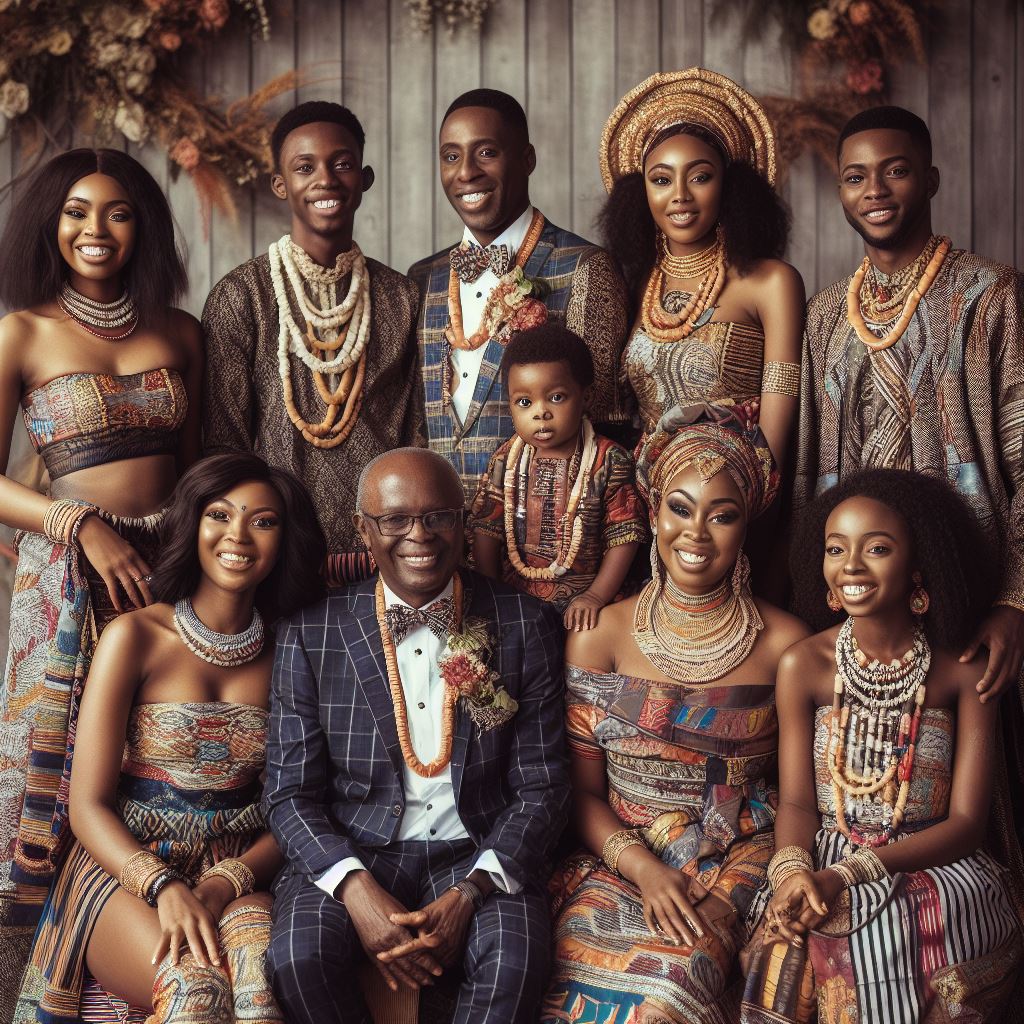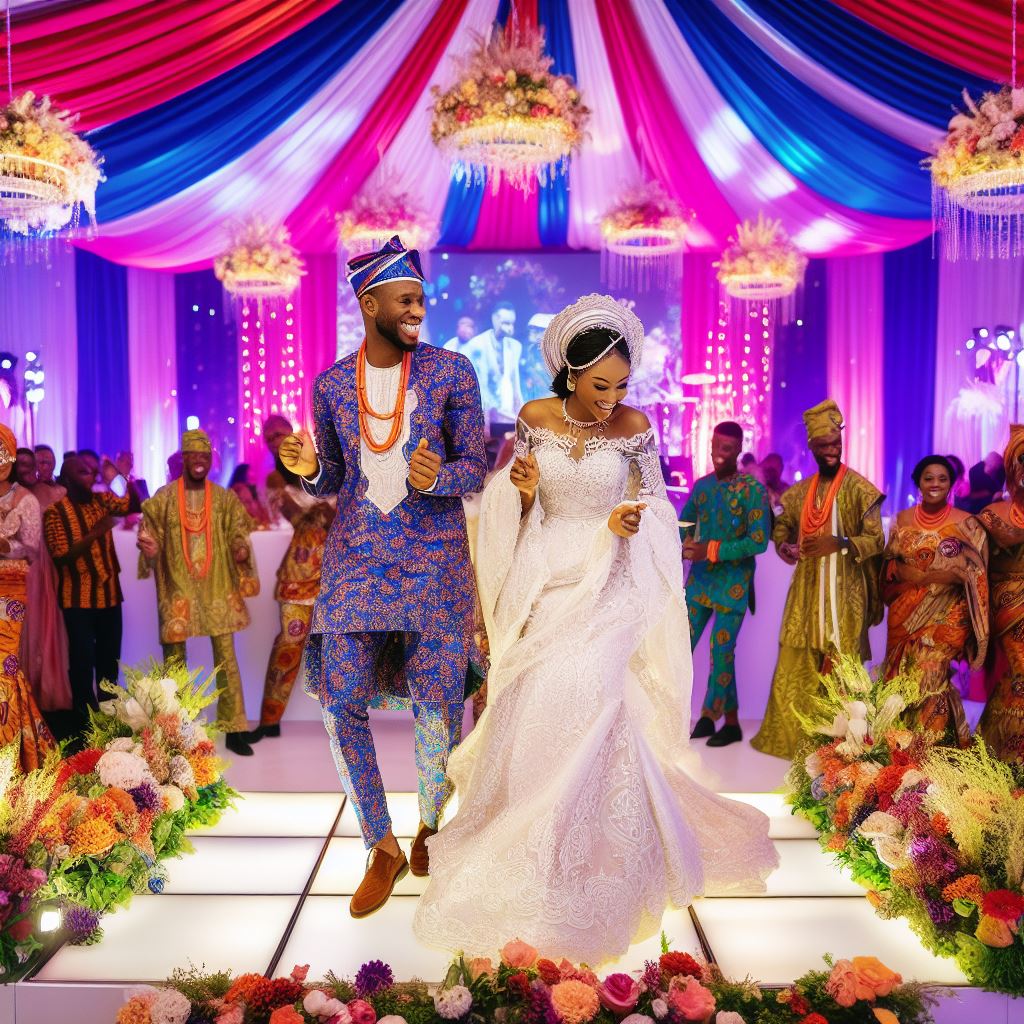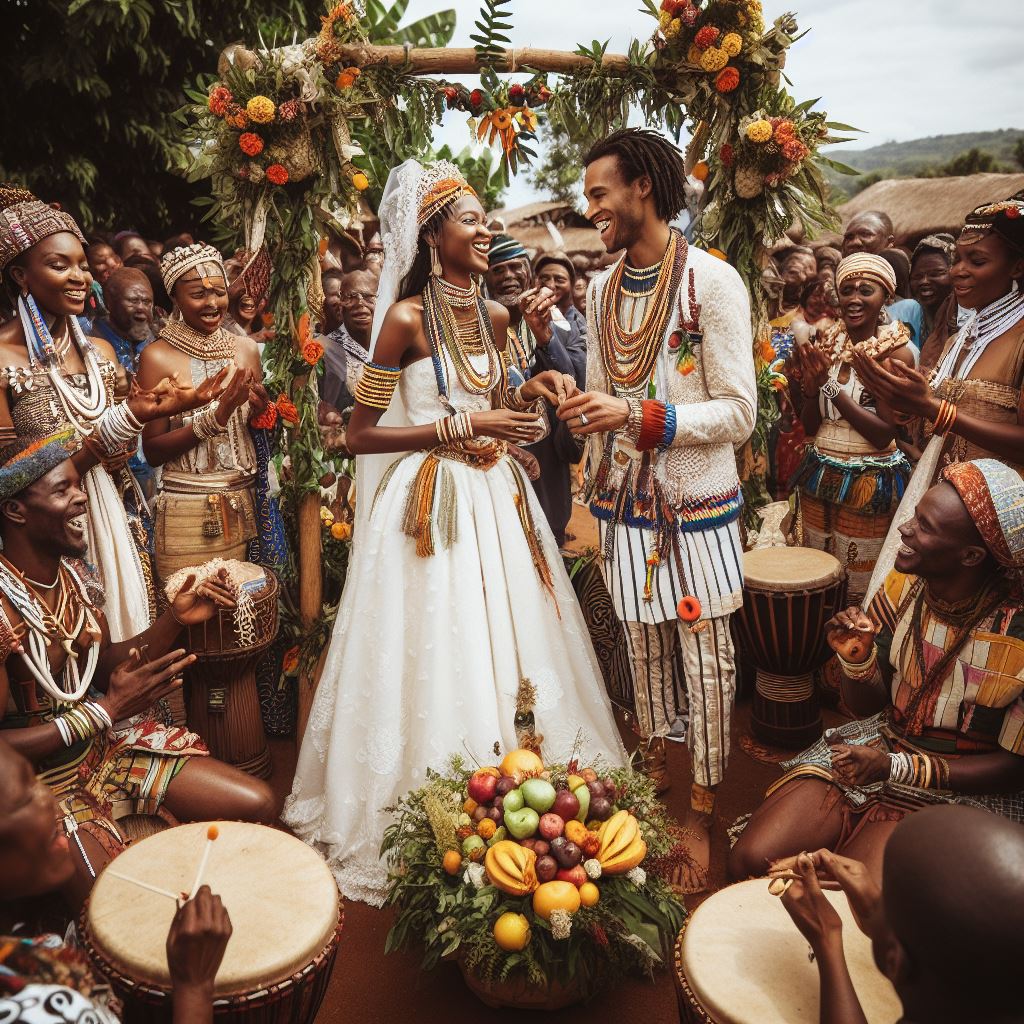Introduction
Overview of the importance of family in Nigerian culture
In Nigerian culture, family holds great importance and plays a significant role in marital decisions.
Family serves as the cornerstone of Nigerian society, emphasizing values such as respect, unity, and loyalty.
Within this context, family involvement in marital decisions is considered crucial for several reasons.
Firstly, the Nigerian society values the idea of collectivism, where decisions are made with the consent and input of the entire family.
Marriage is seen as a union not just between two individuals, but also between two families.
The significance of family in marital decisions
The family’s role in marital decisions extends beyond providing support and advice to the individuals involved.
They actively participate in the selection process, ensuring compatibility, and assessing the potential partner’s character.
Family members contribute their experience and knowledge to make informed decisions.
They consider factors such as social status, education, financial stability, and compatibility of background and values.
Moreover, family involvement helps in maintaining social order and harmony.
It helps to minimize the risk of conflicts and enhances the chances of a successful and long-lasting marriage.
The role of family in Nigerian marital decisions also extends to the negotiation of the marriage arrangements.
Families often discuss matters like dowry, wedding traditions, and future responsibilities, creating a solid foundation for the couple’s future.
Family holds immense significance in Nigerian culture and its role in marital decisions is vital.
Through their involvement, families foster unity, ensure compatibility, and contribute to the overall success of marriages.
Historical context of Nigerian family structure
Traditional family structures in Nigeria
- Traditional family structures in Nigeria have been defined by strong cultural norms and values.
- The extended family system plays a crucial role in Nigerian society, shaping marital decisions.
- In Nigeria, families are usually large and consist of not only immediate relatives but also distant relatives.
- Kinship ties hold great significance, and family members are expected to provide support to one another.
- Marriage decisions are often influenced by the desires and opinions of the extended family.
- The extended family system ensures that individuals have a support network and access to resources.
- Elderly family members, such as grandparents, hold authority and are respected for their wisdom.
- Traditional family structures promote communal living and cooperation among relatives.
- These structures have been maintained over generations and continue to shape marital decisions.
- The extended family system also contributes to the preservation and transmission of cultural practices.
- Marriages in Nigeria are often seen as uniting not only the couple but also their respective families.
The extended family system and its influence on marriage decisions
- Extended family members play a significant role in the matchmaking process and can veto or approve potential partners.
- The extended family’s involvement in marital decisions is rooted in the belief that marriage is a communal affair.
- Close-knit family ties help ensure compatibility, stability, and the guarantee of support within the marriage.
- The extended family’s support is essential for successful navigation of challenges within the marriage.
- Traditional family structures in Nigeria provide a sense of belonging and identity for individuals.
- Marital decisions are influenced by factors such as social status, religion, and ethnic background.
- The extended family system reinforces the importance of kinship and communal harmony.
- However, as Nigeria undergoes modernization, the influence of the extended family system may be evolving.
- Urbanization, globalization, and changing societal values have started to impact traditional family structures in Nigeria.
The historical context of Nigerian family structures reveals the significance of the extended family system in shaping marital decisions.
The emphasis on communal living, support networks, and the authority of elder family members has played a crucial role in generations of marriages.
However, the influence of urbanization and globalization may be slowly challenging traditional structures.
Nonetheless, the extended family system remains a fundamental aspect of Nigerian culture and continues to impact marital decisions today.
Influence of parents in Nigerian marriages
The role of parents in selecting potential partners
Parents play a significant role in Nigerian marriages, with their influence extending to the selection of potential partners.
The concept of arranged marriages and its prevalence in Nigerian society
Arranged marriages are a common practice in Nigerian society, where parents actively participate in finding suitable spouses for their children.
This tradition is deeply rooted in the cultural fabric of Nigeria, and it continues to shape the marital landscape.
Reasons behind parental involvement, including preserving family honor and ensuring compatibility
One of the primary reasons behind parental involvement in marital decisions is the preservation of family honor.
In Nigerian society, the reputation and standing of a family are crucial, and a child’s marriage reflects on the entire family.
By actively participating in the selection process, parents ensure that their child enters into a union that upholds their family’s honor.
Furthermore, parental involvement is driven by the desire to ensure compatibility between the two families.
In Nigeria, marriages are not seen solely as a union between individuals, but rather as a merging of two families.
Parents believe that by selecting a partner themselves, they can ensure that the families share similar values, beliefs, and social status.
The match-making process involves multiple factors such as economic background, education level, and ethnic and religious compatibility.
Parents meticulously consider these factors to create a harmonious union that aligns with their expectations.
Another significant reason for parental involvement is the desire to safeguard their child’s future happiness and well-being.
Parents believe that their experience and wisdom enable them to make better decisions when it comes to selecting a life partner.
They strive to protect their children from potential heartbreak, disappointment, or unsuccessful marriages.
By actively participating, parents hope to guide their children towards a happy and fulfilling married life.
Nevertheless, it is important to note that parental involvement in Nigerian marriages is not always rigid or oppressive.
While some parents may enforce their decisions, others take on a more advisory role, respecting their child’s autonomy.
Many Nigerian couples value and seek their parents’ advice and wisdom, considering it a valuable resource.
The influence of parents in Nigerian marriages is deeply ingrained, shaping the choices and decisions of the younger generation.
Yet, as Nigerian society evolves and becomes more modernized, the role of parents in marital decisions is gradually shifting.
Younger Nigerians are now empowered to make their own choices, although respect for parental guidance remains evident.
As traditions evolve and perspectives change, the balance between parental influence and individual autonomy continues to be redefined.
Read: Commitment and Marriage: Bible Verses to Live By
Involvement of extended family members
When it comes to making marital decisions in Nigeria, the involvement of extended family members plays a significant role.
This blog section delves into the influence of extended family, stresses the significance of seeking advice from elders, and highlights elder siblings’ role in marriage decisions.
The influence of extended family members in marital decisions
Extended family members, including uncles, aunts, and even grandparents, often have a say in who their younger family members choose to marry.
Their influence is rooted in the belief that marriage is not just a union between two individuals, but between families.
Traditionally, extended family members play a vital role in arranging marriages, especially in rural areas.
They consider factors such as social status, financial stability, and compatibility between families when making decisions.
The importance of seeking approval and advice from older family members and relatives
In Nigerian culture, seeking approval and advice from older family members and relatives is crucial. It is seen as a sign of respect and acknowledges their wisdom and experience.
Younger individuals often consult their parents, grandparents, or older siblings to seek guidance in making important decisions regarding marriage.
The thoughts and opinions of these elders hold significant weight and influence the final decision.
The role of elder siblings and their impact on marriage choices
In Nigerian families, elder siblings often act as role models and have considerable influence over the marriage choices of their younger siblings.
Having gone through the process themselves, elder siblings provide guidance based on their own experiences and help navigate the complexities of choosing a life partner.
They may advise on compatibility, cultural traditions, and practical considerations.
Furthermore, elder siblings’ successful marriages serve as examples for their younger siblings, shaping their perceptions and expectations in finding a suitable spouse.
Family’s role in Nigerian marital choices is significant.
Highly esteemed in Nigerian culture, extended family influences and advice-seeking from elders, particularly elder siblings, hold crucial roles.
Understanding these dynamics is essential when exploring the topic of family involvement in Nigerian marital decisions.
Read: Strength in Unity: Marriage Verses from Ecclesiastes
Impact of cultural and religious beliefs
How cultural and religious beliefs shape marital decisions in Nigeria
Cultural and religious beliefs have a significant impact on marital decisions in Nigeria.
These beliefs shape the expectations and preferences of individuals and families when choosing a life partner.
Traditional beliefs, customs, and rituals play a crucial role in the selection process.
For example, in some Nigerian cultures, the approval of the family’s elders is necessary before finalizing a marriage.
Religious teachings also influence marital decisions as they provide guidelines and values for relationships.
Influence of religious teachings on marital decisions
In Nigeria, where religion holds immense importance, people often seek partners who share the same religious beliefs.
This preference is based on the belief that shared religious values will contribute to a harmonious and fulfilling marriage.
Adhering to religious teachings can also influence decisions regarding divorce or separation in Nigeria.
Religious teachings often discourage divorce and emphasize the importance of maintaining marital unity.
As a result, individuals may consider religious teachings as a factor when facing challenges in their marriage.
Additionally, cultural and religious beliefs may influence the prioritization of family approval in marital decisions.
In Nigeria, it is common for parents and extended family members to have a say in the choice of a life partner.
Marriage, seen as uniting two families, emphasizes family opinions for societal harmony, making decisions a collective choice.
Furthermore, cultural and religious beliefs can also impact the selection process based on caste or tribe.
Some Nigerian communities expect individuals to preserve cultural identity by marrying within their tribe or caste, fearing inter-marriage disrupts social order.
Cultural and religious beliefs can also influence marital decisions through the practice of arranged marriages.
In certain Nigerian cultures, parents or matchmakers play a vital role in finding suitable life partners.
Arranged marriages are often based on compatibility in areas such as social status, education, and family background.
These factors are considered essential for ensuring a secure and stable future for the couple.
Read: Couples of the Bible: Stories and Marriage Verses
Factors considered in Nigerian marital decisions
Factors Considered in Nigerian Marital Decisions
Nigerian families consider numerous factors when making marriage decisions.
These choices go far beyond the individual preferences of the bride and groom, reflecting the deeply ingrained communal nature of Nigerian society. Let’s explore these factors in detail.
Financial Stability
Financial stability is a paramount consideration. Families often assess the prospective spouse’s economic standing and their ability to provide for the family.
Social Status
Social status carries weight. Marrying into a family with a reputable standing in the community is highly prized.
Reputation
Reputation matters greatly. Families examine the potential spouse’s character, ensuring they align with the family’s values.
Connections
Connections are crucial. Marrying into a well-connected family can open doors and create opportunities for both spouses.
Education
Education is a significant factor. Families often look for partners with compatible educational backgrounds and aspirations.
Tribe
Tribe plays a role. Marrying within one’s tribe can strengthen cultural bonds and traditions.
Compatibility
Compatibility is key. Families assess the compatibility of personalities, interests, and goals between potential spouses.
In Nigerian marriages, individual desires often intertwine with these familial considerations.
The union of two individuals extends to the unity of two families, cementing bonds that reach far beyond the couple themselves.
While modernity and urbanization have influenced some aspects of marriage decisions, the core values of family, community, and tradition remain steadfast in shaping the choices of Nigerian families.
Appreciating marriage’s profound significance in Nigerian society requires grasping how love and partnership merge with collective family interests.
Read: Love and Respect: Unearthing Biblical Verses on Marriage

Modern influences on Nigerian marital decisions
Shift from traditional to modern marriage practices in Nigeria
- Families arranged past Nigerian marriages based on factors such as social status, wealth, and family connections.
- However, with the passage of time, there has been a significant shift towards more modern practices.
- Young Nigerians now have more freedom to choose their partners based on compatibility, love, and personal preferences.
Influence of Western culture and globalization on choosing a life partner
- Western culture and globalization have played a crucial role in shaping Nigerian marital decisions.
- Exposure to Western ideals through media, education, and travel has influenced Nigerians to adopt more liberal attitudes towards marriage.
- The concept of individuality and personal choice has become more important in selecting a life partner.
- Young Nigerians now consider factors such as shared values, common interests, and emotional connection when making marital decisions.
Growing trend of love marriages and increased individual agency in decision-making
- Love marriages, where couples choose each other based on romantic feelings, are on the rise in Nigeria.
- This trend is a result of increased individual agency in decision-making, particularly among the younger generation.
- Nigerian youths are now more independent and have greater control over their own lives, including who they marry.
- Emotional compatibility and love have become significant factors in selecting a life partner.
Challenges and implications of modern influences on Nigerian marital decisions
- While the shift towards modern marital practices has brought positive changes, it has also presented challenges.
- Traditional family expectations and cultural norms often clash with modern ideals of individual choice.
- Some families still prefer arranged marriages and may oppose love marriages, leading to conflicts.
- Additionally, the influence of Western culture can sometimes lead to cultural erosion and disconnection from Nigerian traditions.
- Balancing modern influences with respect for cultural values and family dynamics remains a challenge.
Modern influences, such as the shift from traditional practices, Western culture, and globalization, have reshaped Nigerian marital decisions.
More Nigerians now prioritize individual choice, emotional connection, and love in selecting a life partner.
However, there are also challenges in reconciling modern influences with traditional family expectations and cultural norms.
Ultimately, striking a balance between personal agency and cultural values is crucial for a successful Nigerian marriage.
Challenges and conflicts arising from family involvement
In Nigerian culture, the role of the family is significant in marital decisions. While this can provide support and guidance, it can also lead to challenges and conflicts that affect individuals involved.
It is essential to understand and address these issues to ensure a healthier and more balanced approach.
Potential conflicts that may occur due to family involvement in marital decisions
One of the potential conflicts arising from family involvement is the clash between individual preferences and family expectations.
In many cases, families have certain expectations regarding the choice of a spouse, which may not necessarily align with the individual’s own desires.
This conflict can create tensions and disagreements between the individual and their family members, leading to emotional distress.
It can also result in feelings of guilt and confusion for the individual, torn between respecting their family’s wishes and pursuing their own happiness.
Moreover, family involvement can sometimes lead to issues related to control and decision-making power.
In some situations, families may exert undue influence over the marital decision, leaving the individual with limited agency or choice in the matter.
Individuals may resent their power imbalance, feeling compelled to conform to family desires against their interests and values.
Cases of forced marriages and the consequences on individuals involved
One extreme consequence of family involvement in marital decisions is the occurrence of forced marriages.
Individuals in forced marriages experience coercion, often due to family pressure, leading them to marry against their will.
This practice not only violates an individual’s right to free choice but also has severe consequences on their well-being.
Forced marriages can lead to emotional and psychological trauma, as individuals may feel trapped in a relationship they did not consent to.
Furthermore, forced marriages often result in limited educational and economic opportunities for the individuals involved, especially for women.
This perpetuates a cycle of inequality and can have long-lasting effects on their personal growth and development.
Address the importance of striking a balance between tradition and personal choice
In Nigerian culture, balancing tradition and personal choice is vital in marital decisions, fostering open communication to reduce conflicts.
Furthermore, educating communities about the importance of consent, gender equality, and individual autonomy can contribute to a shift in societal norms and attitudes towards marriage.
While family involvement in Nigerian marital decisions can have positive aspects, there are also challenges and conflicts that may arise.
By addressing these issues and striking a balance between tradition and personal choice, individuals can experience healthier and more fulfilling relationships and marriages.
Conclusion
Significant role of family in Nigerian marital decisions
The family plays a significant role in Nigerian marital decisions.
Throughout this section, we have explored the various ways in which family influences the choices individuals make when it comes to marriage.
From arranged marriages to parental approval, family norms and traditions deeply impact the choices individuals have.
The complex interplay between tradition, culture, and individual choice
However, it is essential to recognize the complex interplay between tradition, culture, and individual choice.
While family pressures may exist, individuals are ultimately making decisions that align with their own desires and values.
Nigerian society is becoming more open to the idea of personal choice in marriage, giving individuals greater agency in selecting their partners.
This section has shed light on the evolving nature of Nigerian matrimonial practices.
While the influence of family is still significant, there is a gradual shift towards considering individual preferences and compatibility.
Marriages in Nigeria now depend on personal compatibility and mutual consent, not just tradition and cultural norms.
Overall, the family remains a central force in Nigerian marriage decisions, but individuals now have more freedom to make choices that align with their own aspirations.
As society continues to evolve, it is likely that the role of family in Nigerian matrimonial practices will continue to adapt, highlighting the importance of striking a balance between tradition and personal choice.




